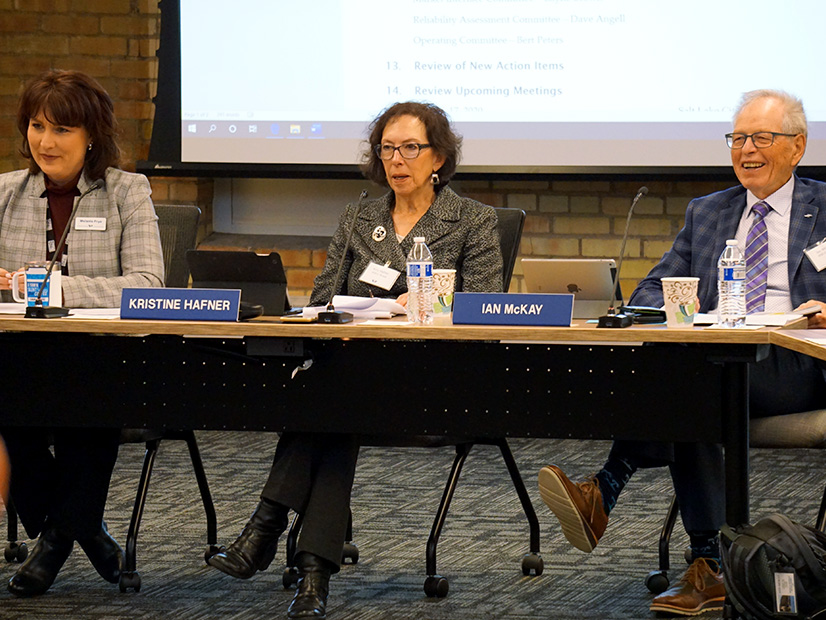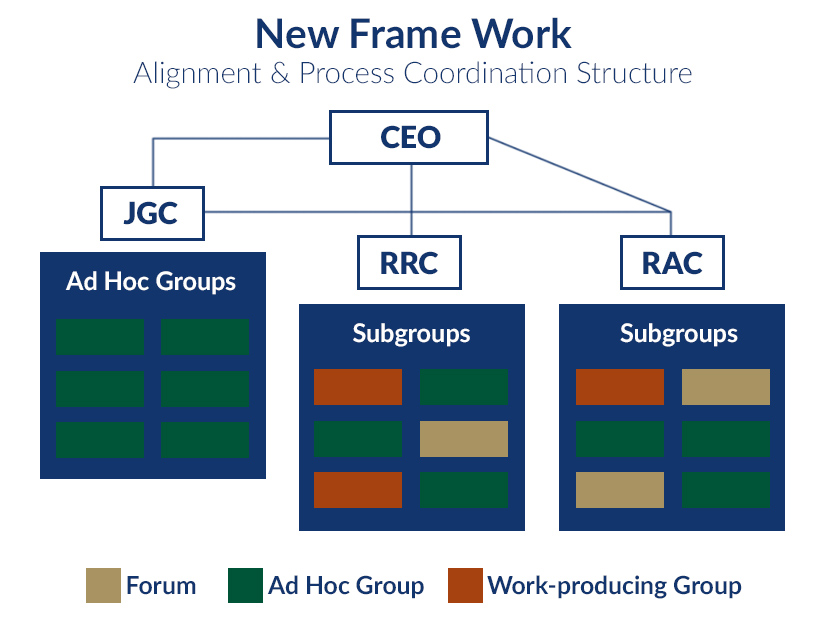
WECC’s Board of Directors last week approved a proposal to reorganize the regional entity’s stakeholder group structure, marking the conclusion of a year-long effort that provoked resistance from members who feared the changes could diminish their say in the organization’s decision-making.
WECC management initiated the shakeup last October to better align the work of WECC’s technical standing committees with the organization’s new focus on ensuring resource adequacy in the Western Interconnection. (See Plan Would Consolidate, Cull WECC Stakeholder Groups.)
And while the final plan fell short of earning undivided support among stakeholders, it did in the end gain assent from two important corners — WECC’s Member Advisory Committee (MAC) and the Western Interstate Regional Advisory Body (WIRAB).
Speaking at Thursday’s quarterly WECC board meeting, MAC Chair Brenda Ambrosi, market policy and operations manager at BC Hydro, said the MAC had been “deeply engaged” in the effort. She expressed appreciation for the “numerous” updates WECC leaders provided her committee on the various iterations of the proposal. (See WECC Overhauls, Expands Stakeholder Committee Plan.)
“Overall, the MAC members ultimately supported the proposal, although not unanimously, but we did recommend positive action be taken in anticipation that the technical committee proposal will be approved today by the board,” Ambrosi said.
“I’d like to acknowledge and congratulate WECC staff and the [Stakeholder Engagement Task Force], who have made great efforts over the past year to bring this issue over the finish line, where I was glad to see this proposal before the board for approval and moving on to the implementation phase,” WIRAB Chair and Idaho Public Utilities Commissioner Kristine Raper said.
The plan approved Thursday consolidates two of WECC’s three standing technical committees — the Market Interface (MIC) and Operating (OC) committees — into a newly formed Reliability Risk Committee (RRC). The RRC “will be responsible for analyzing situations or events, mitigating known risks, and identifying potential future risks to the system, as well as performing emergent work” assigned by WECC’s CEO or Joint Guidance Committee (JGC), according to WECC.
“This will be done the same way the OC and MIC do today — examining issues, analyzing system performance, reviewing and approving work products for industry use, creating guidelines — and by any other means suitable for identifying, analyzing, and sharing information about risks to the BPS. However, the RRC creates more opportunity for market and operational perspectives to be considered jointly in the analysis of risk,” WECC said.
A co-chair structure is designed ensure that both market and operating perspectives are represented on the RRC. A steering group consisting of the RRC’s co-chairs and the chairs of its subgroups will guide the committee and develop its work plans.
The proposal leaves intact WECC’s other standing technical committee, the Reliability Assessment Committee (RAC), which will continue its regional reliability assessment work while also taking on resource adequacy assessments as requested by WECC management, the board, or other bodies. WECC leaders had previously determined that the committee’s focus already aligned with WECC’s organizational aims.
New and Improved JGC
Earlier versions of the plan had proposed to disband the JGC and replace it with a more authoritative Committee Review Body (CRB), but the final iteration left the JGC intact while endowing it with broader powers and responsibilities. (See Stakeholders Balk at WECC Oversight Plan.)
Whereas the JGC is currently charged with discussing the work plans of standing committees and seeking opportunities for collaboration among committees and work groups, the newly empowered JGC will:
-
-
- review work plans for alignment with WECC’s strategic objectives and risk priorities, while also ensuring those plans contain adequate detail — rather than just “monitoring.”
- perform gap analyses of the work plans to identify reliability risk priorities not being addressed.
- assign work to “existing or new groups” to address any identified gaps.
-
The JGC will also have enhanced oversight over the long-term direction of the technical committees, including:
-
-
- performing “rolling reviews” of each committee every three years, as well as reviewing committee and work group charters and recommending changes for board approval.
- preventing “scope creep” among committee work groups.
- reviewing any concerns related to a work group and parent committee and advising WECC’s management and board “as appropriate.”
-
The JGC will also be responsible for developing the criteria for creating new subgroups (except for those established by WECC management), ratifying new work groups created by technical committees and identify which subgroups should be retired.
“The single most important provision in this proposal is the streamlining of technical committee governance under the direction and oversight of the Joint Guidance Committee,” Raper said. “Shifting these governance and administrative responsibilities to the JGC will allow subject matter experts to continue to focus on producing timely and meaningful work products. We all know that change is hard, but a strong JGC with good leadership can help streamline this transition.”
‘Steep Hill to Climb’
Before Thursday’s board vote, WECC General Counsel Steve Goodwill said, “What I believe is really important for us to focus on today is sort of what comes next, following the board’s approval of the proposal.”
Those tasks include identifying JGC members, revising the JCG and RAC charters as needed, drafting the RRC charter, identifying impacts on any in-process work products, and kicking off the process of recategorizing work groups based on committee classification.
Goodwill put out the call for volunteers for the role of RRC co-chair from the markets discipline (The operations co-chair position has already been filled.).
“If you want to lead the RRC and its subgroups to do exceptional work on behalf of WECC, please contact us and let us know that you’d like to be considered for appointment as the RSC co-chair, or if you know someone who would be a great co-chair role, please urge them to contact us,” he said.
Goodwill also cautioned that the organizational changes provide just the framework for WECC’s transformation into a reliability-oriented organization.
“The real transformation must come from how WECC actively engages with stakeholders, how we harness the energy, enthusiasm, commitment and knowledge and expertise of literally hundreds of technical SMEs, policymakers, regulators and executives across the Western Interconnection to make the work of WECC our work,” he said.
“I was going to say it’s time to put the rubber to the road, but I think I think we’ve been putting a lot of rubber to the road already to get to this point,” WECC board Chair Ian McKay said after the vote to approve. “But from here on, the implementation is going to be a steep hill to climb, and certainly we need all the support we can [get] from members and stakeholders.”
WECC is targeting Feb. 1, 2022 for completion of the committee changes and hoping to hold the first RRC and RAC meetings that month.



